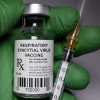
 IJCP Editorial Team
IJCP Editorial Team
Study Indicates That a 'Keto-Like' Diet Might Augment the Risk of Heart Disease
Heart disease in India usually affects people 8 to 10 years earlier than in other parts of the world, specifically heart attacks.
A study showed that 9.8% of participants on a low-carb, high-fat (LCHF) diet encountered a new cardiac event contrasting 4.3% of those on a standard diet.
The ketogenic or "keto" diet prioritizes high amounts of fat and low amounts of carbs. It usually advocates limiting carbohydrates to 10% of total daily calories, protein to 20% to 30%, and obtaining 60% to 80% of daily calories from fat. However, recent research suggests that the low-carb, high-fat "keto-like" diet might double the risk of cardiovascular events, blocked arteries, heart attacks, and strokes. Furthermore, it might also lead to higher blood levels of "bad" cholesterol.
The study was presented at the American College of Cardiology's Annual Scientific Session and the World Congress of Cardiology on 5th march 2023.
Dr. Iulia Iatan, the study's lead author, said, "Our study discovered that routine consumption of a self-reported diet low in carbohydrates and high in fat was linked with raised levels of LDL cholesterol or "bad" cholesterol and a higher risk of heart disease."
During their 11 years of study, the researchers identified 305 participants on LCHF and 1200 people on a standard diet. After an average of 11.8 years of follow-up, they found that people on an LCHF diet had more than two times higher risk of experiencing several major cardiovascular events, such as blockages in the arteries that required stenting procedures, heart attack, stroke, and peripheral arterial disease.
Iatan warned, "Our findings imply that people considering going on an LCHF diet should be aware that doing so could lead to an increase in their LDL cholesterol levels."
The study's findings also indicate that not everyone responds to an LCHF diet similarly. It noted that cholesterol levels tend to rise on this diet; however, some people's cholesterol concentrations can remain the same or decrease, depending on various underlying factors. Hence physician's consultation before initiating any dietary pattern is crucial.

IJCP Editorial Team
Comprising seasoned professionals and experts from the medical field, the IJCP editorial team is dedicated to delivering timely and accurate content and thriving to provide attention-grabbing information for the readers. What sets them apart are their diverse expertise, spanning academia, research, and clinical practice, and their dedication to upholding the highest standards of quality and integrity. With a wealth of experience and a commitment to excellence, the IJCP editorial team strives to provide valuable perspectives, the latest trends, and in-depth analyses across various medical domains, all in a way that keeps you interested and engaged.















Please login to comment on this article